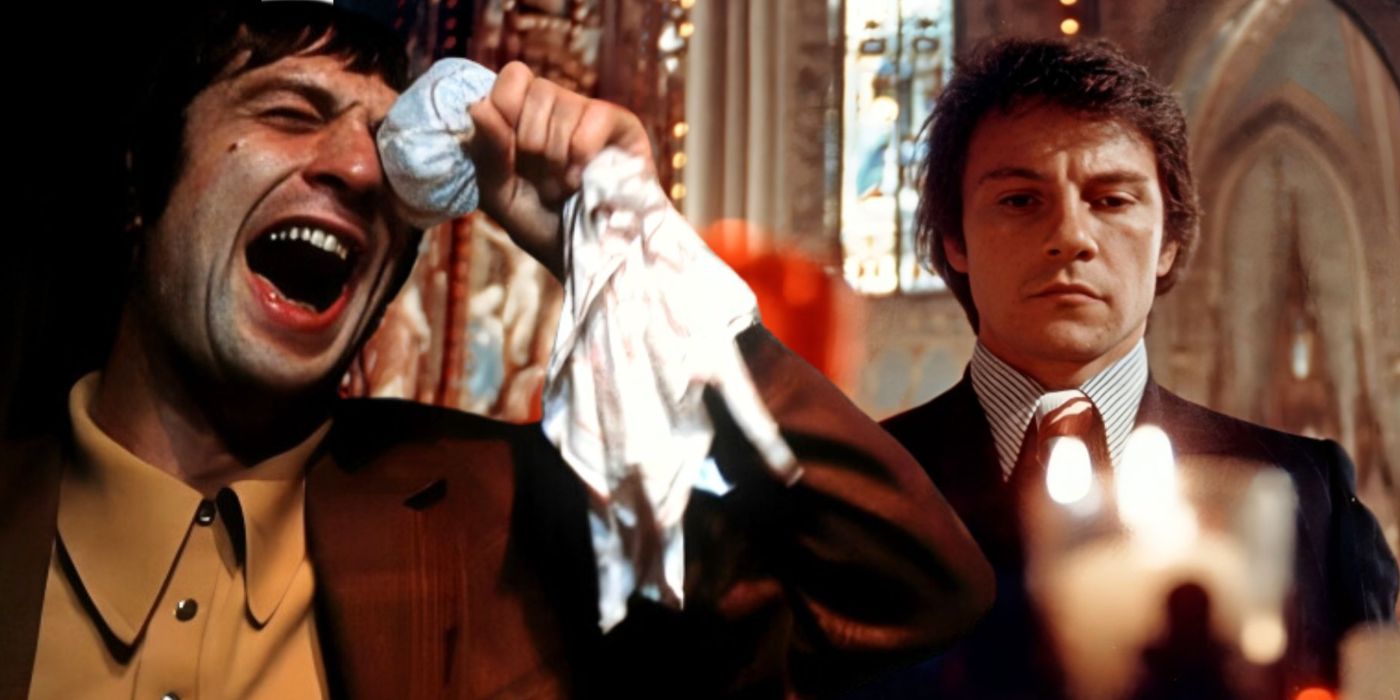
Martin Scorsese’s films often explore themes such as criminal activity, the struggle between individuals and society, and the complexities of human behavior. For instance, Travis Bickle, portrayed by Robert De Niro in “Taxi Driver,” is a Vietnam veteran who takes vigilante justice into his own hands on the streets of New York. Similarly, Henry Hill in “Goodfellas” becomes entangled in the romanticized world of organized crime. While there are numerous other character arcs, Scorsese seems particularly drawn to this thematic narrative. A prime example of this can be found in his 1973 film, “Mean Streets.” Using dark lighting to create atmosphere and camera work within confined spaces, this crime drama demonstrates its timeless relevance and potential for a modern remake.
It might surprise you to learn that this movie marked Robert De Niro’s initial collaboration with the esteemed filmmaker. However, watching “Mean Streets” would never suggest that, given the exceptional performance he delivers. Joining forces with other talented actors such as Harvey Keitel (as Charlie Cappa) and David Proval (as Tony DeVienazo), De Niro brings John “Johnny Boy” Civello to life. This character is a reckless and carefree individual who struggles to fit in with the mafia culture of Little Italy, New York.
Despite earning a respected status in his circle, Charlie feels compelled to steer his unruly friend clear of the loan sharks he’s indebted to, totaling thousands of dollars. Moreover, Charlie is dating John’s cousin, Teresa, who has epilepsy – a genuine neurological condition often dismissed by Mafia members as madness.
‘Mean Streets’ Puts a Telling Spin on the Mafia
In a modern context, Mean Streets could easily hold its ground among contemporary films due to the main character’s complex struggle to reconcile his dual lives and Scorsese’s innovative directing style. The movie takes Charlie through various settings: gritty, dimly lit bars, compact Italian eateries that seem oppressively bright, and religious establishments where he self-inflicts pain as a form of penance. Despite being an engaging crime film with its share of violence, profanity, nudity, and adult themes, Scorsese’s third work also subtly incorporates symbolism into almost every scene, which invites deeper analysis.
In the film “Mean Streets,” the relationship between Charlie Cappa and Johnny Boy mirrors George and Lennie from “Of Mice and Men.” As the movie progresses, viewers are left pondering how far Charlie is prepared to go to maintain Johnny Boy’s acceptance within society. Although the movie doesn’t delve into Johnny Boy’s deteriorating mental state (which could make him more relatable and sympathetic), doing so in a modern adaptation would intensify the impact of the shocking finale even more.
A ‘Mean Streets’ Remake Should Raise the Tension



In addition to resonating with individuals torn between opposing forces, the film “Mean Streets” also pushed the boundaries of the gangster genre. The portrayal of a suit-wearing tough guy, associated with organized crime, delving into such delicate subjects on screen was daring for a newcomer like Scorsese, but it proved to be an exquisite choice. As time has passed and mob movies have lost some of their appeal, a nuanced approach like this could potentially breathe new life into the genre.
As a cinema enthusiast, I believe that if a remake of “The Gambler” were made, it could magnify the tension and truly convey the toll on Charlie by making the Shylock character more intimidating. In the original film, both Keitel and Richard Romanus portrayed aspects of the same character, yet the young mafioso member’s Shylock lacked the necessary menace. Despite Charlie’s efforts to be respectful and find common ground with everyone, the three-way confrontation feels somewhat lacking in intensity. A fresh directorial perspective could infuse more raw emotion into the storyline, making it a more gripping experience for viewers.
Don’t Forget About ‘Mean Streets’ Soundtrack




In “Mean Streets,” there’s an intriguing aspect that can be explored further, and that’s the captivating soundtrack. Alongside popular songs from the ’50s and ’60s, which create a stark contrast with the film’s overall mood through romantic numbers, “Be My Baby” underscores the introductions of Charlie, Johnny Boy, and their tumultuous bond. Despite numerous classic pop tunes being used, they all amplify the effect of what unfolds on screen, helping to transport viewers back to a specific era and setting – a technique still employed by many films, television shows, and even advertisements today. When this story of brotherhood and self-discovery is remade in the future, selecting the appropriate soundtrack could significantly enhance its impact.
50 years have passed since the initial release of this movie titled “Mean Streets”. Despite its numerous accolades from critics like The New York Times, Roger Ebert, and Spike Lee, there are many individuals who haven’t had a chance to watch it. It seems that the current trend of gun-fu and superhero movies has overshadowed other genres. In light of this, how refreshing would it be to revisit a Martin Scorsese classic? At present, you can rent “Mean Streets” on platforms such as YouTube, Prime Video, and Apple TV.
Read More
- Ludus promo codes (April 2025)
- Cookie Run: Kingdom Topping Tart guide – delicious details
- Unleash the Ultimate Warrior: Top 10 Armor Sets in The First Berserker: Khazan
- Cookie Run Kingdom: Shadow Milk Cookie Toppings and Beascuits guide
- Grand Outlaws brings chaos, crime, and car chases as it soft launches on Android
- Grimguard Tactics tier list – Ranking the main classes
- Fortress Saga tier list – Ranking every hero
- Tap Force tier list of all characters that you can pick
- ZEREBRO/USD
- Val Kilmer Almost Passed on Iconic Role in Top Gun
2025-04-06 04:02